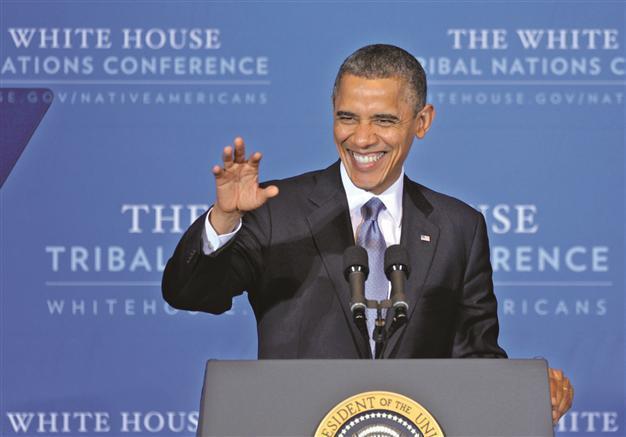US backs off of fiscal cliff
WASHINGTON - Reuters

US President Barack Obama works hard to avoid a financial disaster. AP photo
The Senate moved the U.S. economy back from the edge of a “fiscal cliff” yesterday, voting to avoid imminent tax hikes and spending cuts in a bipartisan deal that could still face stiff challenges in the House of Representatives.In a rare New Year’s session at around 2 a.m. by local time, senators voted 89-8 to raise some taxes on the wealthy while making permanent low tax rates on the middle class that have been in place for a decade.
But the measure did little to rein in huge annual budget deficits that have helped push the U.S. debt to $16.4 trillion.
The agreement came too late for Congress to meet its own deadline of New Year’s Eve for passing laws to halt $600 billion in tax hikes and spending cuts which strictly speaking came into force yesterday.
But with the New Year’s Day holiday, there was no real world impact and Congress still had time to draw up legislation, approve it and backdate it to avoid the harsh fiscal measures.
That needed the backing of the House where many of the Republicans who control the chamber complain that President Barack Obama has shown little interest in cutting government spending and is too concerned with raising taxes, but the outcome was not revealed when the Daily News went to print yesterday evening.
“There’s more work to do to reduce our deficits, and I’m willing to do it. But tonight’s agreement ensures that, going forward, we will continue to reduce the deficit through a combination of new spending cuts and new revenues from the wealthiest Americans,” Obama said.
New deadline
A new, informal deadline for Congress to legislate is today when the current body expires and it is replaced by a new Congress chosen at last November’s election.
The Senate bill, worked out after long negotiations on New Year’s Eve between Vice President Joe Biden and Senate Republican Minority Leader Mitch McConnell, also postpones for two months a $109 billion “sequester” of sweeping spending cuts on military and domestic programs.
It extends unemployment insurance to 2 million people for a year and makes permanent the alternative minimum tax “patch” that was set to expire, protecting middle-income Americans from being taxed as if they were rich.
The tax hikes do not sit easy with Republicans but conservative senators held their noses and voted to raise rates for the rich because not to do so would have meant increases for almost all working Americans.
“It took an imperfect solution to prevent our constituents from a very real financial pain, but in my view, it was worth the effort,” McConnell said.
A campaign-style event held by Obama in the White House as negotiations with Senate leaders were taking place on Dec. 31 may have made it more difficult for Republicans to back the deal. In remarks to a group of supporters that resembled a victory lap, the president noted that his rivals were coming around to his way of seeing things.
















